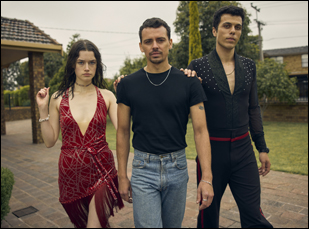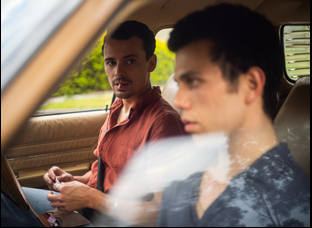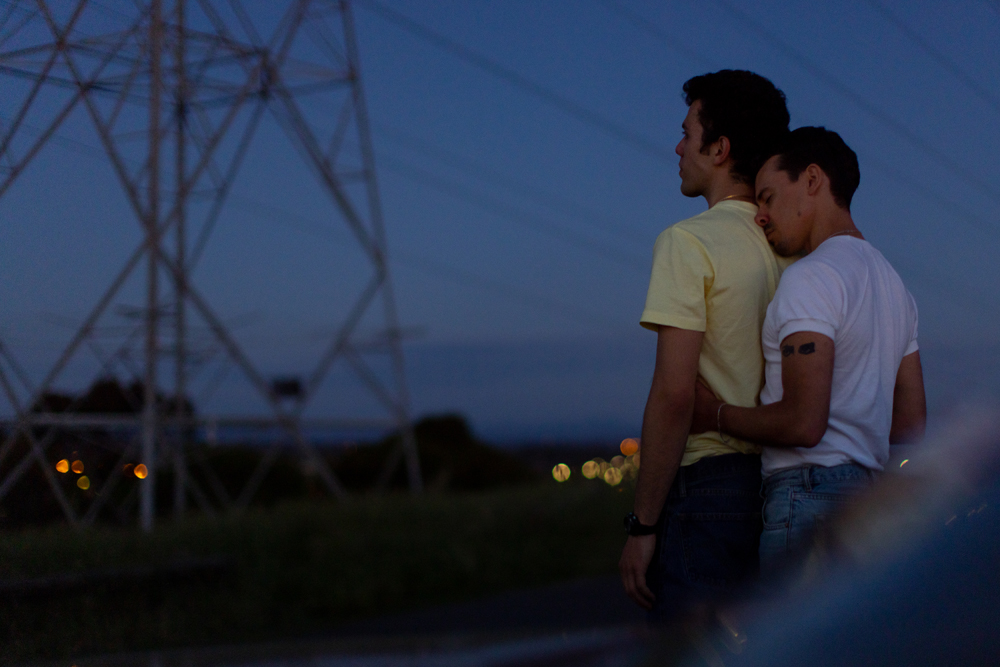There are a number of ways to court danger on a film set, but as other filmmakers will know, to truly live on the edge, you might want to write a song into the script that you haven’t entirely nailed down the rights to beforehand. Then there’s what Goran Stolevski did for “Of An Age.”
“When you’re writing about a dialogue built around a Tori Amos B-side, and it’s a key scene [where] you can’t really rephrase it, if you have to change the song and you have to figure out something else entirely, [that would] shift the whole dynamic,” said Stolevski, who’s slept easier since the licensing process for his sensational second feature, which started well before production began, ended. “I had that specific song in mind, and I did think eventually there would be like a more traditional score in the film, but then I found in the editing process that like, shaping sequences around individual tracks worked better, and the eclecticism of it also worked better…there were challenges at all points — like right up until like the final day of sound mix, there was still one song we had to clear that was extremely important to me, but it all worked out.”
The writer/director might not have wanted it any other way when the unseen peril in getting exactly the right soundtrack mirrors the quiet yet palatable tension throughout “Of An Age,” an enthralling love story that for most of its duration keeps the heart beating as much out of the thrill of seeing two people make a connection as summoning the fear of opening up to oneself someone else. Nikolai (Elias Anton) isn’t actually even out of the closet yet when “Of An Age” begins, though his parents have to be suspicious of his passion for ballroom dancing and its attendant spangly suits. He’s less nervous about them finding out than he is about making it to a local competition when his partner Ebony (Hattie Hook) frantically calls him hungover the morning of, not knowing where she is and even if she did, Nikolai wouldn’t have a car to pick her up in. With few other options, he ends up ringing up her brother Adam (Thom Green) as a last resort, and since Nikolai hasn’t yet met him, the long drive to find her starts to feel far shorter when they start to get to know each other.
“Of An Age” would be a remarkable film under any circumstances, but particularly so when at least on the surface it couldn’t seem any more removed from Stolevski’s brilliant debut feature “You Won’t Be Alone,” a supernatural thriller set in 19th century Macedonia, yet is every bit as tense. Initially joining Ebony’s reverie from a wild night out, the film gloriously stumbles into focus once Nikolai and Adam start talking and find out they have some common interests, particularly in literature, before Nikolai learns Adam’s moving abroad for a post-grad in linguistics, prompting Nikolai to ask “how long does a Ph.D take?” The electricity between them is never in question, but the two would seem to have little power over everything else as life takes them in different directions and Stolevski captures both the passion between them and the ennui of knowing they may not be meant to be together with equally impressive depth. On the eve of the swooningly romantic drama’s release, Stolevski generously spoke about how having no career plans has yielded such an exciting time in his life, how the inspiration for “Of An Age” came from living through a particularly frustrating period and how he ends up being so well prepared to capture as much lightning in a bottle as he does.

There’s not an ounce of strategy to my approach to life. [laughs] If I tried to be strategic, it’d explode in my face. When I wrote “You Won’t Be Alone,” it was originally something to fill my day to not go crazy. I needed to lose myself in something creative because life was not going well. I just turned 30 – and it was not a good development at the time. Even in writing it, I [thought] I’ve written so many features and none of them have been clicking, so the notion of someone financing an esoteric witch story in an entirely foreign dialect with prosthetics and VFX in 19th century Macedonia, but it’s really about their feelings…would anyone finance that as a first movie or even a second or third? I just thought that was never going to get made.
Then I wrote [“Of An Age”] a lot later, but I only ever really write based on something that sets the heart bumping in that particular moment. I feel like I tap into a wave of feelings and try to shape a story around that that can hold me in terms of writing it for a really long time. I’m as attached to each of them, but on a practical level, I never expected “You Won’t Be Alone” to even get made, much less as a first film and a lot of people were surprised with “Of An Age” [because] it felt like it was a smaller scale to them. To me, it’s a big film, and I’m only going to do things that feel worth it. I just shot a third film and that’s an even smaller film in terms of money spent, but in terms of size and story and feelings, they’re all equally big. Filmmaking is really hard on a day-to-day level. You find yourself in situations you have no control over, so the feeling needs to be worth it, not the budget or the size.
I don’t think there are any bigger stakes than what you’ve got going on in this car. Was it difficult figuring out a structure for how these two people reveal themselves to each other over time?
Writing this was a strange experience in that it flooded out of me so quick. The moment I got even just the seed of it — two guys driving across Melbourne in 1999 — there was just a wave of dialogue that I was struggling to keep up with, like typing frantically at like 2 am in the middle of the night. In just the first session, 60% of what is now the script was written — not in a structured way, but in a way that I could follow. It took me a week to finish writing the rest of it and I needed to write it very quickly because there was a rawness to it for me. I didn’t want to do the second-hand, diluted version. I needed it to be written in a moment where it was very emotionally immediate and to hold on to that feeling. Then the challenge was to make it feel like when I was the age that Nikolai is in the film, where [seeing] Isabelle Huppert or Wong Kar Wai [from] where I was was the opposite of life. It was the waiting room before life begins at university. Now, with this movie, I was like, “How do I make my life and my feelings of that period have value?” To me, the only feelings that had value according to that scale were the feelings that were the feelings that would fill a movie screen, and without sanitizing what being a teenager in Melbourne was, [I wondered] is there a way to make these feelings feel the size of a big screen?
What was it like seeing Thom and Elias together for the first time? I understand it might not have been until getting to set because of the pandemic.
Yeah, Thom lived in a different city — we’ve now converted him, he lives in Melbourne where he belongs, with the rest of us. [laughs] But initially everything was done via Zoom, you know, the ideal place to do chemistry tests. [laughs] But they met in real life about three weeks before the film shoot, and we all spent a lot of time together. From the moment they met, I could see they were so invested in making sure the other one felt as safe and appreciated and prioritized. There’s a case of actors being very narcissistic and self-absorbed, almost as narcissistic and self-absorbed as directors. [laughs] But with these two, there was a lot of generosity in making sure the other one is also very comfortable and that’s not something you can always predict. But I did find that even in their audition tapes, I didn’t [get a sense] they were putting on their selfie face and trying to seem cool. There was a sense of wanting to connect with someone. And I think any kind of chemistry you hope to generate has to come from that, finding people who are really looking to connect through their acting rather than present a persona.

I plan obsessively and shot list and re-shot list and then the night before the shoot, I do another shot list and on the morning of each shoot day, I throw away the fucking shot list. I’m very much looking at what’s in front of me, how do we make this into something meaningful and connected to the rest of what we’ve been doing and the shot list is kind of the backup. And if at the end of a particular sequence or at the end of a particular shooting day, what we shot is identical to what I already envisioned, I’m a little bit like, “Did I miss something? I’m a bit bored.” I really look for things that happen on set in a way that you shouldn’t or cannot plan. And my cinematographer and production designer work in the same way [where] like we create an environment and then let it loose. It’s controlled, but only to a certain extent.
The only thing I can compare it to — it’s extremely pretentious so please bear with me — is Jackson Pollock. I know, I know. But it’s like splash painting, throwing paint at a canvas and you see a certain effect, it feels like it might land somewhere or not, and you don’t really know what you’re going to get. But if you do it long enough, you can control it. If you try to paint those individual splashes in advance, it’s flat. There has to be a life in itself that the feelings need to be discovered organically, from within, rather than just instructed. So with directing or making a movie, really how we approach it is we create an environment and orient it in a certain way so that it leads to something that you’re envisioning at the end and ideally builds on that a bit deeper.
When you’re confined to a static location like a car for much of the film, is that an exciting opportunity or a bit maddening?
Before we shot that sequence, yeah, it was maddening. There was a lot of thought that went into it, like what the hell do we do? How do we maintain this visually? But it was great. We were always going to prioritize the very tight close-ups and a shallow depth of field, so there’s a closeness and an intimacy. Also, even though you don’t really see the roads they’re driving past, we were looking for particular colors and textures, like layers of shade and light, so that there is a sense of life floating in all directions behind them at all times. It’s not to be fancy. It’s about capturing a certain feeling that I associate with adolescence especially.
It wasn’t really until we shot that first sequence where they’re driving along together, stuck in a car and meeting each other for the first time, whether I knew was actually going to work. I had bits written in the script that were cutaways of specific images of streetlife going on in the background, but that moment, those two sat in the car and started talking, we were running two cameras for that particular sequence, probably for logistical reasons and I don’t think it could be anywhere else other than right immediately next to them because I think we, as the viewer and as the filmmaker, need to be under Nikolai’s skin or Adam’s skin. From Nikolai’s perspective, it’s like Adam’s eyes are the entire world. Nothing else exists.
There’s things that are fleeting and somewhere in the background, and you have a sense of movement and everything is kind of hectic because you’re still like a distractable teenager and overwhelmed, but to you, this is the whole world. So I can’t really cut away to a church or a set of trash cans on the side of the road and maintain that in a way that feels respectful of your feelings and what you’re undergoing in that moment. So I let the characters and the actors and their gestures shape the scene, starting from that close-up and in this case, I already felt like this close-up has me covered, so we finished like three hours early that day we were filming. It was ridiculous because it just felt so electric between the two of them.
When “You Won’t Be Alone” had a bit of a curtailed release due to the pandemic, what’s it like to have this one getting out into the world in such a big way?
I wasn’t lucky with “You Won’t Be Alone” in that when it premiered at Sundance, that was online, but it was released theatrically and Focus was very generous and brought me here and I did attend some screenings. That was special and then there were some festivals I could attend and a lot of them I couldn’t, but only because I was shooting something else instead, which is the best problem to have in life. So I’ve had a little bit of it already, but [with] it happening again, it’s strange that it feels familiar at all. I’d kind of given up on any dream that felt like this years ago because it was unrealistic, so there’s a lot of pinch me moments. I’m here [in Los Angeles] with my husband who’s been with me since 2004, so he’s followed most of my filmmaking journey and he understands what it’s taken and he’s part of that experience. Both of us are just like, “how is this real right now?”
“Of An Age” opens on February 17th in limited release.




